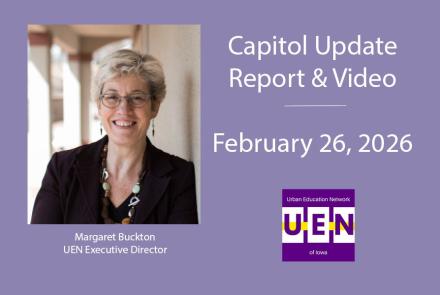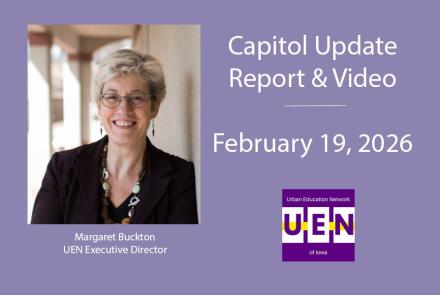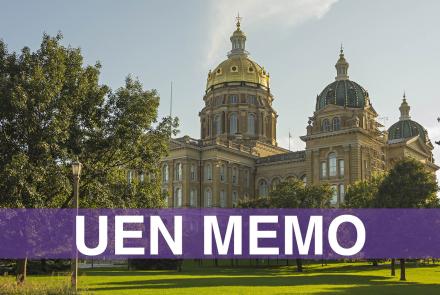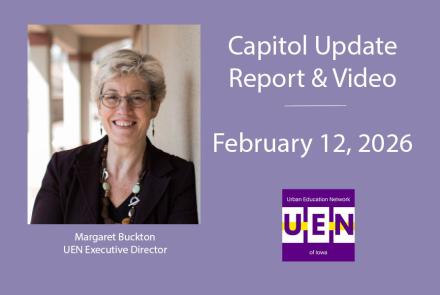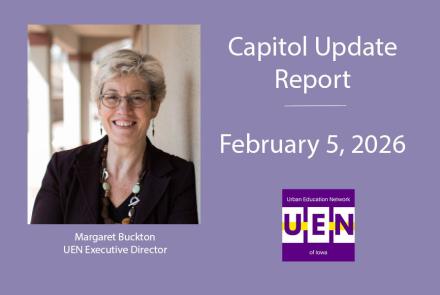Captiol Update - January 29, 2021
UEN Legislative Update
January 29, 2021
In this UEN Report of the third week of the 2021 Legislative Session, find information about:
- In-Person Parent Option Bill to the Governor
- School Choice Bill Amended and Clears the Senate
- Additional bills on the move
- Senate and House Education Committee Members
- Finding Biographical and Contact Information for your Legislators
- Advocacy Resources
Download the Full January 29, 2021 Capital Update Report
School Choice Bill Approved in the Senate: Check the UEN web site for the updated Call to Action posted at https://www.uen-ia.org/blogs-list
In-Person Instruction Parent Option: SF 160 was amended and passed in the Senate and the House agreed to the Senate’s version, sending it to the Governor. She has scheduled a bill signing for today, Jan. 29 at 11:00.
The bill requires schools to offer parents an option for in-person instruction full time (equivalent of 180 days or 1,080 hours) beginning no later than the second Monday that is at least two weeks following the effective date of this Act. (With enactment today, that day is Feb. 15.) The bill requires schools to offer parents the ability to select full-time in-person instruction for their students unless this requirement is explicitly waived for one or more school districts or accredited nonpublic schools in a Governor’s Public Health Disaster Emergency proclamation. The bill requires schools not already offering the full-time option on the effective date of this act provide parents notice of the opportunity to select full-time in-person instruction and allow the parent at least 5 days to decide their selection if the school will still offer other instructional options. The bill doesn’t require districts to offer 100% virtual or hybrid models, but also doesn’t preclude those options. The bill specifies that instructional hours held virtually or via hybrid learning only count if provided in compliance with this law, 2020 legislation, or under the Governor’s proclamation related to COVID-19.
The bill also specifies additional factors that the DE shall consider in granting an exception to allow primarily remote learning to include the number of teachers in COVID-19 quarantine as well as a scarcity of bus drivers and substitute teachers. The bill is effective on enactment (once signed by the Governor.) UEN is registered as undecided on the bill, had sought an amendment to require vaccination of staff prior to implementation, but that was not accepted. UEN is opposed to the mandate for parent option but supportive of the additional criteria upon which to grant waiver for 100% remote learning.
Bans Diversity Plan Open Enrollment Regulation: The House Education Committee this week approved HF 228 Voluntary Diversity Plans, sending the bill to the House Calendar. The bill bans the ability of five districts with voluntary diversity plans (Davenport, Des Moines, Postville, Waterloo and West Liberty) from regulating open enrollment out of the district based on their plans, which currently review socioeconomic status (income) or English-language learner classification as metrics to consider. (None of these districts uses race as a metric, which was banned as a sole measure of consideration by a Supreme Court decision in 2007.)
The goals of the diversity plans are to preserve a mix of diversity and prevent segregation of schools in these districts. There is a solid research base that shows a concentration of poverty which hits a tipping point at 50-60% and segregated schools negatively impacts student achievement, economic growth and workforce diversity for such communities. See the UEN Issue Brief explaining the issue and showing data on poverty, minority, open enrollment and certified enrollment for these districts and for similar districts without voluntary diversity plans. This Brief was shared with subcommittee members in the House and posted to the comments section of the legislative website. The provisions of this bill are included as Division III in SF 159 Governor’s School Choice Omnibus Bill, as approved in the Senate Thursday, Jan. 28. The bill moves to the House Calendar and UEN is registered in opposition.
Governor’s Omnibus School Choice Bill: SF 159 was amended and approved by the Senate on Thursday, by a vote of 26:21 with two senators excused, and will be assigned to the House Education Committee. The bill includes;
- Student First Scholarship Program (vouchers) for resident students in public schools identified for comprehensive support and improvement;
- Charter Schools chartered by school boards or other entities independent of the school board;
- Elimination of Voluntary Diversity Plan district authority to regulate open enrollment out of the district;
- Education Information, Program Standards and Funding section includes mandatory district use of state selected student information system and fee charged to schools,
- New Flexible Student and School Support program and new funding flexibility;
- Expands educator tax credits and tuition and textbook tax credits;
- Open enrollment changes with additional good cause related to lack of student success and eliminates 90 waiting period for extracurricular eligibility for students open enrolling for good cause;
- School Board powers and duties.
The LSA has issued a Fiscal Note on Thursday, Jan. 28. The following impacts are included in the note found here. The LSA estimates that a Student First Scholarships will cost $5,270 a year, and that the number of students using them will increase going forward. Using estimates of 345 students in the first year, 520 in the second year and 735 students in the third year, the impact to school districts of reductions in state aid and reduced property taxes, will be -$2.1 million (FY 2023); -3 million (FY 2024) and -$3.8 million (FY 2025). The reductions in state aid will be slighter larger than state payments for scholarships, so GF revenues will grow: $200,000 (FY 2023); $400,000 (FY 2024); FY 800,000 (FY 2025). The LSA estimates that the Charter School and Diversity plan provisions will not impact state revenues but that the changes could affect enrollment and could impact school districts, including reductions for Des Moines schools ($1.42 million); Davenport schools ($783,000) and Waterloo schools ($421,000). The establishment of a mandated statewide student information system, with a possible fee of up to $7 per student, could cost school districts up to $3.5 million. The LSA estimates that the changes to the Tuition Tax Credit will reduce state revenues by about $46 million and that adding refundability to the credit could increase local income surcharges by about $400,000. The LSA estimates that the increasing the deduction for teachers for qualified expenses would reduce GF revenue in FY 2023 and FY 2024 due to expected changes in the state tax law from the 2018 legislation. The LSA estimates that the other provisions have no impact on state revenues or that the fiscal impacts cannot be estimated.
UEN is opposed to this bill. See the UEN Call to Action, updated Jan. 28 for changes made in the Senate.
See IASB’s School Voucher Toolkit for Key Messages and other supports, such as Maps of Private Schools in Iowa and Map of Voucher Eligible School Buildings:
Map of Private Schools in Iowa: This map shows where private schools are located in Iowa and which legislative district they are in. Show your legislators that rural students will not benefit from a voucher program and public schools are their best and only choice.
Map of Voucher Eligible School Buildings: This map shows where school buildings are identified in need of comprehensive support and improvement under the federal Every Student Succeeds Act (ESSA), making their students eligible for the voucher program in Iowa. The map compares where those schools are located to the location of private schools that a voucher could be used to attend.
SSA School Funding: No bills on school funding to set the state cost per pupil have yet been introduced.
UEN is advocating for the legislature to appropriate $95-100 million for school funding this year, as they have typically done over the last decade plus. Due to the drop in enrollment statewide of 5,935 last fall, next year’s budget costs the state less to adequately fund a reasonable increase. The $95-100 million could fund an increase of 3.9-4.0% in the state cost per pupil. Given how hard educators and all school staff have been working through this difficult year, and because it is affordable to the state, we encourage the legislature to reach this funding goal for FY 2022. As an added bonus for taxpayers, higher SSA reduces budget guarantee property taxes. At the Governor’s 2.5% recommendation, 137 districts are eligible for Budget Guarantee, costing local property taxpayers $25.9 million statewide (and only costing the state $20.1 million). The 4.0% SSA places 76 districts on the Budget Guarantee, at only $7.3 million paid by local property taxes. That is actually less than the current year’s $8.3 million Budget Guarantee.
Check out the difference for your district with the ISFIS New Authority Calculator tool. Share this impact with your legislators. The SSA clock is ticking. Iowa Code requires the Legislature and Governor to set the SSA rate within 30 days of the release of the Governor’s budget, which is by Feb. 12, 2021.
Bills on the Move:
Senate Floor Action in addition to SF 159 Governor’s School Choice Omnibus Bill
SF 130 School Board Member Income Limit: this bill allows a school board member to earn more than the $6,000 limit in the conflict of interest statute if working in the district as a substitute teacher, bus driver or food/nutrition work during the 2020-21 school year. The bill was approved in the Senate 47-0 and moves to the House Education Committee. UEN is registered in support.
SF 183 Construction Manager-at-Risk: this bill allows a governmental entity to enter into a guaranteed maximum price contract for the construction of a public improvement and prohibits governmental entities from entering into design-build contracts. The LSA published a fiscal note which says the impact on local governments cannot be determined. UEN is not yet registered on this bill. Please let us know if you have concerns. The bill was approved by the Senate, 28-19 and is now in the House State Government Committee.
House Education Committee Action:
HF 14 PK eligibility: this bill allows children who turn 5 between March 15 - September 15 to be eligible for the statewide preschool program and funding if the school enrolls such students. Applies to the 2022-23 school year through 2024-25 school years. Approved by the Committee 22-0. UEN is registered in support and advocating for funding to be provided for the 2021-22 school year for increased preschool enrollment.
HSB 104 Open Enrollment Billing Clarification: this bill changes the timing of determination of district responsibility for covering special education costs to the district of residence based on the count date, which aligns the responsibility for an open enrolled student to the district receiving the state aid for the student. Approved by the Committee 22-0. UEN is registered in support.
HSB 105 At-risk Children: the bill allows AEAs to use certain appropriated funds related to early childhood programs to use the funds for other child development programs and strikes outdated language. Approved by the Committee 22-0. UEN is registered as undecided.
HSB 106 Education Funding Requests for Students in Placements: this bill changes the methodology used by schools to calculate funding requests to the DE for providing education services to children in foster care, juvenile detention or residential treatment facilities based on days in the program instead of months in the program. This is the method that DE has been using, so aligns Code with current practice. Approved by the Committee 22-0. UEN is registered as undecided.
HSB 110 Senior Year Plus Proficiency Determination: this bill defines processes for determining proficiency and when one of those doesn’t apply, allows school districts to jointly adopt rules with community colleges on alternative requirements to show proficiency for a student to qualify for a college sharing/concurrent enrollment course. The bill is effective on enactment. Approved by the Committee 22-0. UEN is registered in support.
Approved by House Human Resources Committee
HF 294 Telehealth Reimbursements (formerly HF 89): this bill requires reimbursements for telehealth services to be the same as in-person reimbursements. Prohibits a health carrier from requiring a health care professional to be in the same room as a person and defines terms. The bill was approved by the House Human Resources Committee and moves to the House Calendar. UEN is registered in support.
Senate and House Education Committee Members
The following links will take you to each committee member’s legislative page, with email address and often home or cell phone number so you can easily connect with them. The Governor’s School Choice and in-person learning bills will be in the Senate Education Committee on Monday. The Diversity Plan bill will be in the House Education Committee as early as Monday.
Senate Members
|
House Members
|
Connecting with Legislators: Find biographical information about legislators gleaned from their election web sites on the ISFIS site here: http://www.iowaschoolfinance.com/legislative_bios Learn about your new representatives and senators or find out something you don’t know about incumbents.
Find out who your legislators are through the interactive map or address search posted on the Legislative Website here: https://www.legis.iowa.gov/legislators/find
To call and leave a message at the Statehouse during the legislative session, the House switchboard operator number is 515.281.3221 and the Senate switchboard operator number is 515.281.3371. You can ask if they are available or leave a message for them to call you back.
Advocacy Resources: UEN recently launched a new website. More tools and resources will be added, but go to www.uen-ia.org to find Advocacy Resources such as Issue Briefs, UEN Weekly Legislative Reports and video updates, UEN Calls to Action when immediate advocacy action is required, testimony presented to the State Board of Education, the DE or any legislative committee or public hearing, and links to fiscal information that may inform your work. The latest legislative actions from the capitol will be posted at: www.uen-ia.org/blogs-list. Check out the new UEN Advocacy Handbook linked here, and also available from the subscriber section of the UEN website
Thanks to our UEN Corporate Sponsors: Special thank you to your UEN Corporate Sponsors for their support of UEN programs and services. You can find information about how these organizations may help your district on the Corporate Sponsor page of the UEN website at https://www.uen-ia.org/uen-sponsors.
|
|
Contact us with any questions, feedback or suggestions to better prepare your advocacy work:
Margaret Buckton
UEN Executive Director/Legislative Analyst
margaret@iowaschoolfinance.com
515.201.3755 Cell



